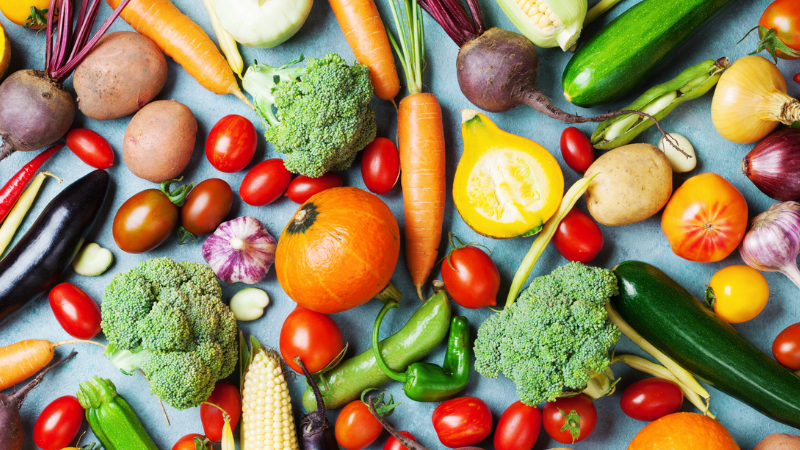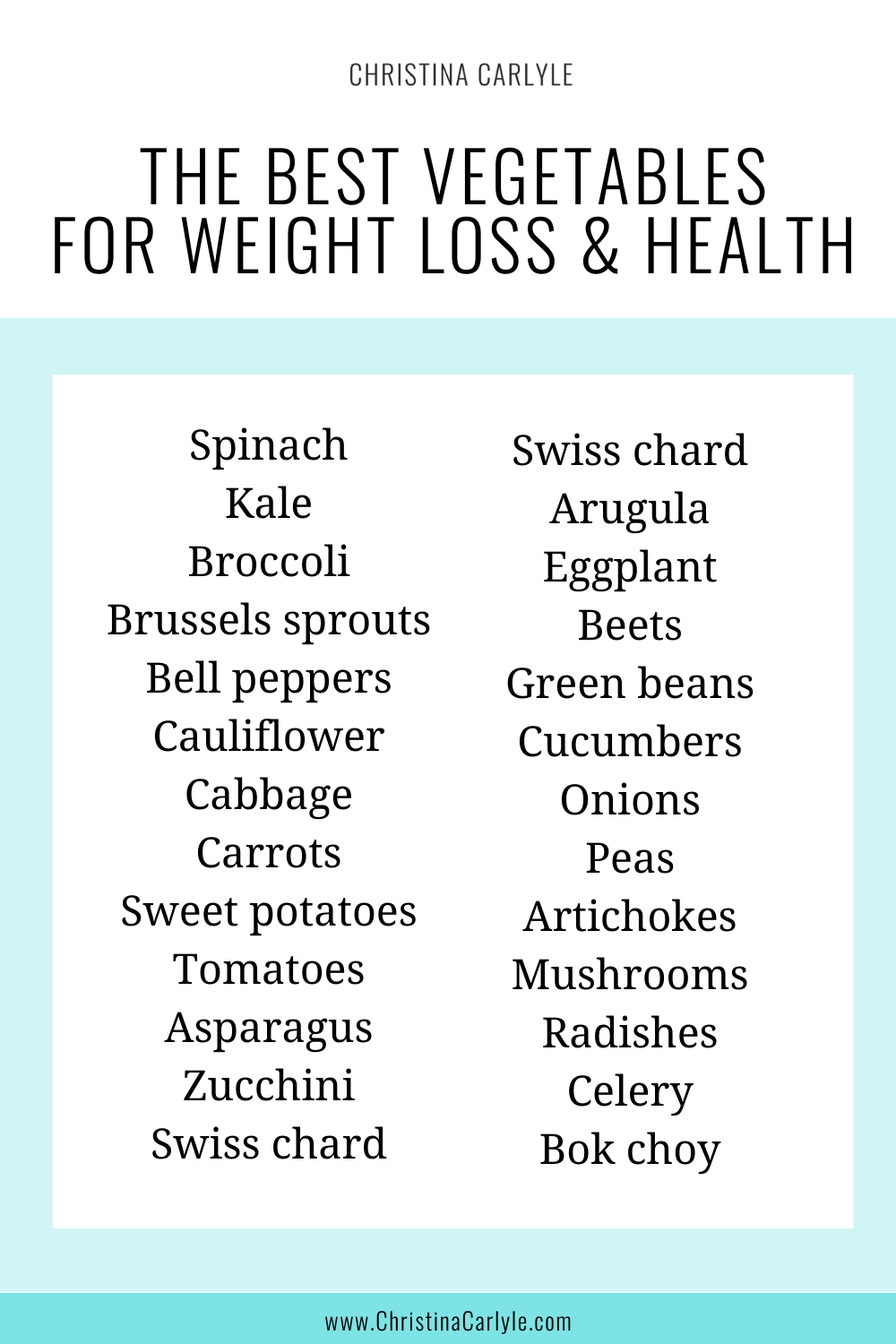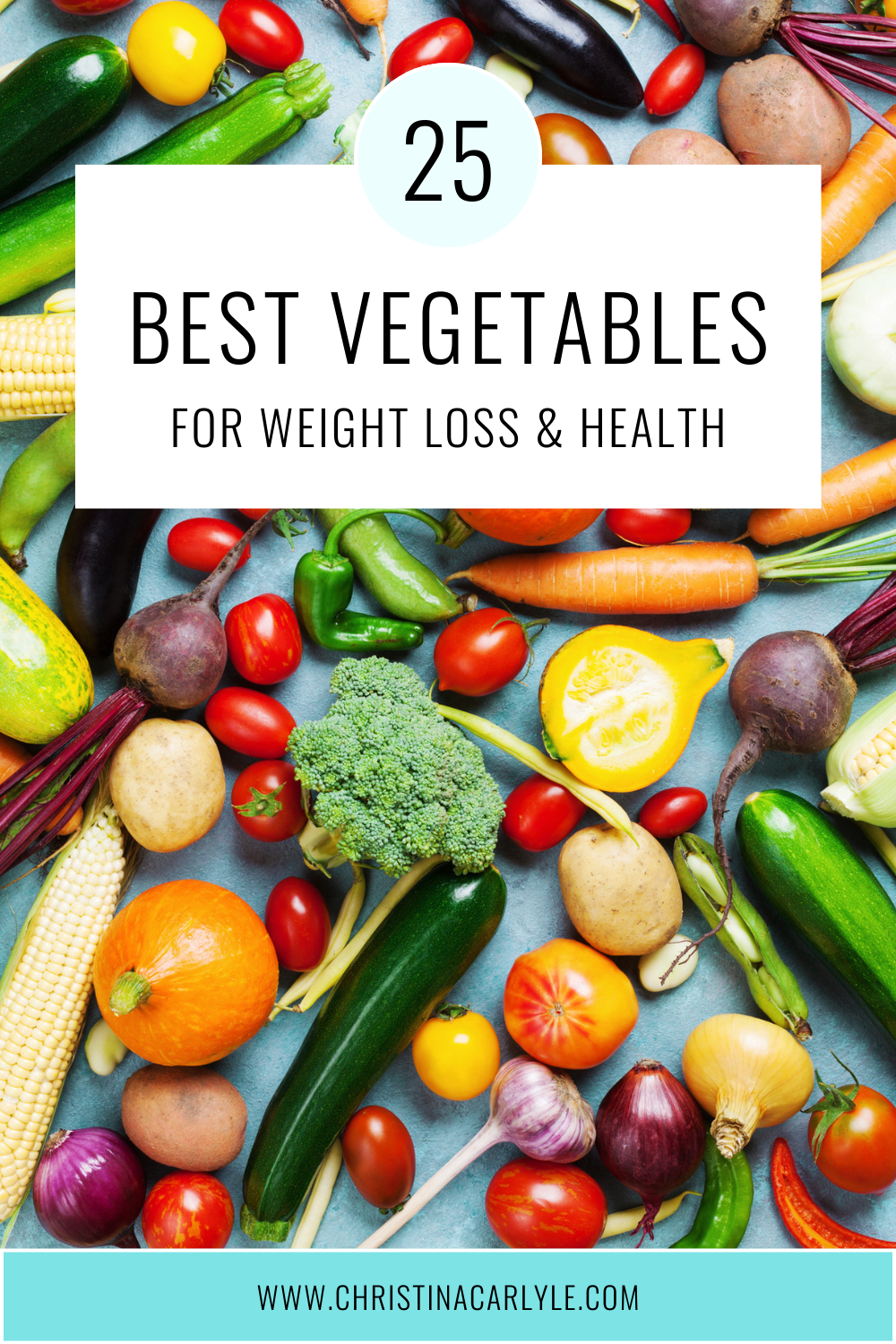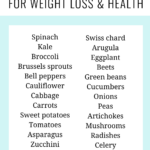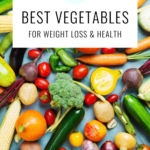Last Updated on August 14, 2023
Wondering what the best vegetables for weight loss are? Look no further!
In this guide, I’m breaking down the top 25 Vegetables for Weight Loss with the most health benefits. If you want to get fit and healthy you need to be eating these veggies every day!
Vegetables have a wealth of essential nutrients, including vitamins, fiber, and minerals. In my opinion veggies are the absolute best food for weight loss because they have lots of nutrients needed for optimal metabolic function without many calories.
Eating these nutritional powerhouses with every meal can profoundly enhance your metabolism, energy levels, and overall well-being.
Why are Vegetables great for Weight Loss?
Compared to other food options, vegetables have a low caloric content while being abundant in nutrients (vitamins, minerals, and antioxidants), water, and fiber. Typically, a mere 1-cup serving of vegetables contains a measly 20 to 50 calories.
Nutrients are mandatory for weight loss and a fast metabolism. With vegetables, you’re able to eat a lot of volume with tons of metabolism-boosting nutrients for minimal calories & sugars, making them a no-brainer for weight loss.
The micronutrients in vegetables help boost metabolism and immunity, which can help prevent/reverse symptoms and conditions that contribute to weight gain… Things like inflammation, hormone imbalances, gut health issues, and mitochondrial dysfunction all of which contribute to cravings, fatigue, bloat, stubborn fat, and low mood/motivation. And that’s just the nutrients vegetables have. The fiber in vegetables makes them a very healthy, natural weight loss aid.
Fiber, which is classified as a type of carbohydrate, plays a pivotal role in weight loss due to its gradual passage through the digestive system, fostering prolonged feelings of fullness. The calories present in fiber remain unabsorbed, essentially providing a gratifying volume and satiety – without a ton of calories.
This, in turn, helps suppress appetite over the course of the day, further helping reduce caloric intake and stabilize hunger patterns. Moreover, fiber also acts as a buffer and helps prevent abrupt spikes in blood sugar and insulin, potentially curbing fat storage, crashes, and cravings.
The fibers and nutrients in vegetables are mandatory for optimal gut health… and as I’ve already discussed – gut health is critically important for weight loss and wellness.
While an excess of calories can be stored as fat, surplus fiber is an exception. Fiber traverses predominantly intact into the large intestine, where it serves as sustenance for gut bacteria that generate advantageous compounds like short-chain fatty acids (SCFAs). Notably, a 2019 study spotlighted in Nutrients revealed that SCFAs might contribute to the promotion of fat-burning processes.
Many vegetables have a high water content, contributing to hydration and a feeling of fullness. You obviously know you can drink water to get hydrated but a lot of people don’t realize that you can eat water to stay hydrated, too. Eating vegetables helps keep you hydrated and hydration is crucial for weight loss, as thirst can sometimes be mistaken for hunger and dehydration can lead to overeating.
Diversity in a diet helps with weight loss. Vegetables come in a wide range of flavors, textures, and colors, making meals more enjoyable and satisfying. Their versatility allows you to change cooking styles. Raw, roasted, grilled, air-fried, sauteed, etc. Cooking different vegetables using different cooking methods is an easy way to make your healthy, high-fiber, low-calorie meals more enjoyable.
Bottom line, vegetables should be eaten to lose weight and maintain weight loss. From a nutritional and metabolic point of view, It’s virtually impossible to get fit and healthy – and stay that way – if you’re not eating vegetables as a part of your daily diet.
How many vegetables should you eat if trying to lose weight?
While veggies are one of the best foods for weight loss I DO NOT recommend eating them exclusively in an effort to lose weight! Consuming vegetables alone would make it difficult to get to a healthy calorie deficit, keep the metabolism running quickly/optimally long-term, and absorb nutrients. Vegetables MUST be consumed along with healthy fats in order for their nutrients to absorb properly.
As a general rule, I recommend having a minimum of 1-2 servings of the following vegetables with every meal (as a part of a balanced diet that also includes fats and proteins) to reap the incredible benefits of these weight-loss-friendly foods!
25 Healthiest Vegetables for Weight Loss
Here are 25 of the best vegetables for weight loss known to boost metabolism, immunity, and energy – while preventing hunger, cravings, and weight gain.
- Spinach: Spinach is a nutrient powerhouse with low calories. Its high fiber and water content contribute to feelings of fullness, aiding portion control. Rich in vitamins A, C, and K, as well as minerals like iron, magnesium, and antioxidants, spinach supports overall health and boosts the immune system.
- Kale: Kale is loaded with nutrients and low in calories. Its high fiber content promotes satiety and digestive health. Rich in vitamins A, C, and K, kale supports immune function. It also contains compounds like sulforaphane that may have anti-inflammatory and cancer-fighting properties.
- Broccoli: Broccoli is high in fiber, vitamins C and K, and antioxidants. Its fiber content aids in digestion and supports feelings of fullness. Sulforaphane, present in broccoli, contributes to detoxification and anti-inflammatory effects, promoting overall health.
- Brussels Sprouts: Brussels sprouts offer a combination of fiber, vitamins C and K, and antioxidants. The fiber promotes fullness and supports digestion, while the vitamins contribute to immune function. The antioxidants help combat oxidative stress and inflammation.
- Bell Peppers: Bell peppers are low in calories and rich in vitamin C and antioxidants. Their crunchiness and vibrant colors make them satisfying to eat, while their nutrients support immune health and protect cells from damage.
- Cauliflower: Low in calories and carbohydrates, cauliflower is a versatile vegetable that can replace high-calorie ingredients. It provides fiber, vitamins C and K, and antioxidants, promoting digestive health and overall well-being.
- Cabbage: Cabbage is a good source of fiber, vitamins C and K, and antioxidants. It supports digestion and gut health. Compounds like glucosinolates have potential anti-inflammatory and anticancer effects.
- Carrots: Carrots are rich in beta-carotene, which the body converts into vitamin A, supporting healthy skin and vision. The fiber content aids in digestion and contributes to a feeling of fullness.
- Sweet Potatoes: Sweet potatoes provide complex carbohydrates, fiber, vitamins A and C, and minerals. The fiber in sweet potatoes (eat the skin!) promotes satiety and stable blood sugar levels, while vitamins support immune health. Their natural sweetness can help satisfy cravings for sweets.
- Tomatoes: Tomatoes are packed with vitamins C and A, as well as the antioxidant lycopene. Lycopene is linked to heart health and may help reduce inflammation. The fiber in tomatoes supports digestion and can aid in weight management.
- Asparagus: Asparagus is low in calories and provides vitamins A, C, and K, as well as folate. Its fiber content promotes digestion and feelings of fullness. The vitamins and antioxidants contribute to overall health and immune function.
- Zucchini: Zucchini is low in calories and carbohydrates, making it a great option for weight loss. It provides vitamins C and B6, as well as minerals like potassium. The fiber content supports digestion and promotes a feeling of fullness.
- Swiss Chard: Swiss chard is rich in vitamins K, A, and C, as well as minerals like magnesium and potassium. Its low-calorie content, combined with its nutrients, supports bone health, immune function, and overall vitality.
- Arugula: Arugula is a low-calorie leafy green with a peppery flavor. It’s rich in vitamins A, C, and K, and its antioxidants contribute to immune support and anti-inflammatory effects.
- Eggplant: Eggplant is low in calories and provides fiber and antioxidants, including nasunin. These components support digestive health, cellular protection, and overall well-being.
- Beets: Beets are nutrient-dense and contain antioxidants, particularly betalains. These compounds contribute to reduced inflammation, improved exercise performance, and potential support for detoxification.
- Green Beans: Green beans are low in calories and rich in vitamins A, C, and K, as well as fiber. Their nutrients promote healthy vision, immune function, and digestive well-being.
- Cucumbers: Cucumbers are hydrating and low in calories. While not as nutrient-dense as some other vegetables, their water content can contribute to satiety and support overall hydration.
- Onions: Onions provide antioxidants, including quercetin, with potential anti-inflammatory effects. Incorporating onions into your diet may aid in immune support and contribute to a varied flavor profile.
- Peas: Peas offer protein, fiber, and essential vitamins and minerals. Their nutrient content supports muscle health, digestive function, and overall well-being.
- Artichokes: Artichokes are rich in fiber and antioxidants, contributing to digestive health and potential detoxification support. Their unique flavor and texture can add diversity to meals.
- Mushrooms: Mushrooms are low in calories and provide B vitamins and minerals like selenium. Certain mushroom varieties contain compounds that can boost immune function and may have anti-inflammatory effects.
- Radishes: Radishes are low in calories and provide vitamin C and other antioxidants. Their nutrients contribute to a strong immune system and cellular health which is necessary for a fast, healthy metabolism.
- Celery: Celery is hydrating and low in calories. While it provides modest amounts of vitamins and minerals, its crunch and water content can contribute to feelings of fullness.
- Bok Choy: Bok choy is a nutrient-rich cruciferous vegetable with vitamins A, C, and K, as well as minerals. Its fiber content supports digestive health, and its nutrients contribute to overall vitality.
I hope this helped inspire you to eat more vegetables! Do you eat these vegetables daily? Which veggies are your favorite?
Let me know in the comments.
Your Coach and Biggest Cheerleader,
![]()
If you liked this article you’ll love everything else in my Best Foods for Weight Loss Series
- Best Healthy Cooking Oils
- Best Protein Powders for Weight Loss
- Best Supplements for Weight Loss
- Best Fruits for Weight Loss
- Best Nuts for Weight Loss
- Best Milk for Weight Loss
- Best Carbs for Weight Loss

